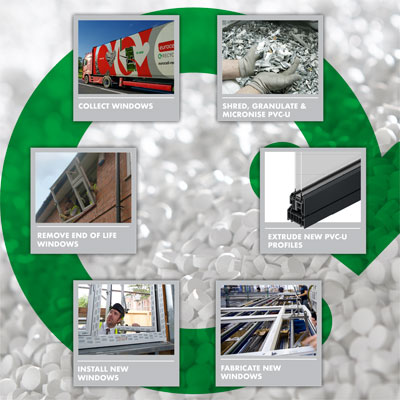The construction industry is under pressure to use more sustainable building methods and product choices. When it comes to also addressing the additional challenges of offsite and modular construction, PVC-U can be part of the solution as the sector starts to prepare for the impact of the Future Homes Standard (FHS) in three years’ time, says Martin Benn, Head of New Build at Eurocell.
Eurocell is working hard to extend sustainable product options for the construction industry through market-leading PVC-U recycling and manufacturing processes. This commitment is helping to reduce the volumes of plastic waste heading for landfill and tackle the problem of carbon reduction. The company offers an extensive range of high performing PVC-U window and door solutions that not only look good, but also help organisations underpin their sustainability objectives.
The nation’s housing stock is viewed by national policy makers as a key component of the long-term ambition to deliver a low carbon future.
COP26 outlined the perils of the impending climate crisis and government moves such as the changes to Part L of the Building Regulations are designed to ensure that we start building more energy efficient, low carbon, sustainable homes. As an interim measure before the full force of the Future Homes Standard becomes a reality in three years’ time, the immediate objective is to direct the construction of new homes so that they produce 31% lower carbon emissions.
According to the Climate Change Committee, the built environment accounts for around 40% of UK greenhouse gas emissions, with approximately 14% of this coming from the 28 million homes in the UK. This puts the future construction of sustainable new homes front and centre in the challenge to ensure we collectively achieve on our future low carbon aspirations.
PVC-U is already playing its part in helping to meet important environmental and regulatory obligations. Set against other potential product choices such as aluminium or timber composite for windows and doors, PVC-U offers long-term durability and high performance, attractive aesthetics to support design visions, cost effective value and, through Eurocell’s vision and industry leading recycling processes, a truly sustainable product solution.
The sustainable choice
To further substantiate the sustainability credentials of PVC-U, the Faculty of Science and Engineering at Manchester Metropolitan University has reviewed an array of data sets and modelling emanating from peer-reviewed publications. This has established a life cycle assessment of the use of recycled PVC-U window frames within Eurocell’s manufacturing operations.
For example, a typical semi-detached house comprising seven windows and a pair of French doors will see an average weight of post-consumer PVC-U within the eight products plus cavity closure of 122kg. Therefore, a development constructing on average 2500 units of semi-detached houses will save around 627 tonnes of CO2 equivalent per year by specifying recycled Eurocell windows and cavity closures over a competitor who is using full virgin PVC-U windows.
Eurocell-Recycle – leading the way
Eurocell has, for the past two decades, been a strong and industry-leading advocate of the wider benefits that recycling can deliver. Its recycling service allows the company to meet two primary objectives: it prevents the requirement for clients to send discarded plastic window and door frame waste to landfill and, secondly, it enables Eurocell to recycle the old plastic window and door frame waste into new PVC-U extrusions used to create the range of products demanded by the trade and consumers.

Two busy waste plastic recycling plants drive the Eurocell-Recycle service, and their combined efforts is delivering tangible benefit.
Based on a ‘closed loop’ recycling system that deals with both post-consumer and post-industrial plastic window waste, the plants are responsible for processing over 40,000 tonnes of plastic window and door frame waste per year – a figure that has been steadily rising as demand for recycled product solutions has grown in recent years.
The closed loop system is a six-stage recycling process. Old and discarded plastic windows, door frames and other plastic offcuts are collected by Eurocell’s fleet from company sites and waste management centres across the UK. On arrival, the material is sorted and separated to divide metals, white polymer, and coloured materials, as well as capturing material which is non-recyclable.
After a transformative process which creates a powder or pellet form, the recycled plastic is used together with virgin PVC-U material by Eurocell to manufacture its extensive range of extruded plastic products.
Recycled PVC-U product choices can support future sustainability ambitions for the construction industry. The challenging targets set by Part L and FHS as we enter a transformative period for the sector, means that the spotlight will remain firmly on those charged with making the sustainability product calls needed if net zero by 2050 is to be achieved.







Leave a Reply
Want to join the discussion?Feel free to contribute!